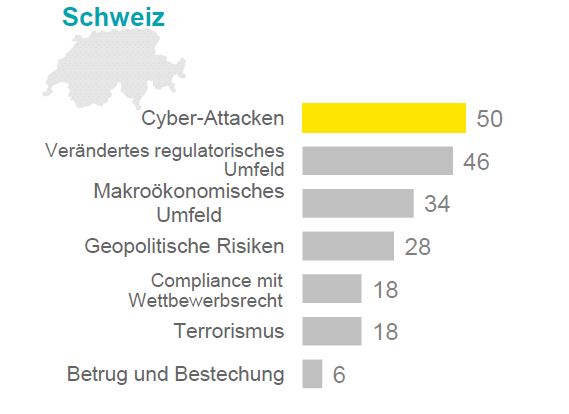Fraud, bribery, etc. - a study
Fraud and corruption, knowledge of compliance rules - how about that? A survey among managers.

According to the biennial international Fraud Survey of the audit and consulting firm Ernst & Young (EY), only 6% of the companies surveyed in Switzerland report having been involved in a corresponding case. In an international comparison, this figure is well below the average of 11% of companies with reported cases. The list is headed by Ukraine (36%), Kenya (26%), Belgium (20%), Russia (20%), Denmark (18%) and Germany (18%).
Even lower than the reported cases of fraud and corruption is the proportion of companies surveyed in Switzerland that consider bribery and corruption to be widespread in Switzerland, at 2%. Only in Germany is the proportion just as low, although the reality there is somewhat different. In countries such as Brazil (96%), Colombia (94%) or Nigeria (90%), on the other hand, corrupt methods are the order of the day according to managers there. The global average is 38%.
Invitations and personal gifts accepted in many places
Only 4% of respondents from Switzerland would approve of payments of bribes to avert an economic downturn. Swiss companies would rather approve of giving personal gifts (6%) or entertaining customers, intermediaries or business partners by means of invitations or similar, which is accepted in as many as 16% of companies.
The Swiss companies surveyed see fraud and corruption as hardly a relevant problem for their future business success. With only 6% mentions as well, Switzerland ranks last among the countries participating in the study. Swiss managers see the dangers much more strongly in the area of cyber risks (50%), the complex and growing regulatory environment (46%), and geopolitical risks (28%).
Lack of knowledge of international compliance regulations
Swiss companies are apparently not very well informed about new, internationally applicable laws. With regard to the new EU data protection legislation, only 42% of the companies surveyed say they know it in detail. This is only just above the international average of 40%. Even companies in non-EU countries such as Mexico or Nigeria claim to be better informed on this point, with 50% each. Swiss companies are even less familiar with the United States Department of Justice's 2017 Guidance Document on the Evaluation of Corporate Compliance Programs. Only 10% say they know and understand it.
Compliance rules take effect
"The comparatively low number of detected fraud cases in Switzerland is, among other things, an indication that the compliance rules introduced in recent years have been able to take effect," says Michael Faske, Head of Fraud Investigation & Dispute Services at EY, commenting on the results. "In addition, there is a high degree of sensitivity to transparency and compliance in Switzerland," Faske added. At the same time, cases that do occur are also reported and recorded with a high degree of reliability, he added. In countries where the discovery of cases of fraud and corruption is predominantly a matter of chance, the number of unreported compliance cases is significantly higher than in countries with a more pronounced compliance culture.
Nevertheless, there is no reason for Swiss companies to sit back and relax: "The fight against fraud and corruption must also be conducted continuously in Switzerland and become part of the corporate culture - even if the rate is low. Employees must be regularly trained and sensitized. And management must exemplify a zero-tolerance policy," Faske warns. This is especially important with regard to due diligence with third parties, since the companies are often globally positioned or at least networked. Faske is surprised that 26% of the companies do not have clear due diligence rules tailored to country, industry and service.
Younger people more likely to engage in unethical behavior
The fact that ethical business conduct compatible with law and order cannot be taken for granted is shown in particular by the younger generation's greater willingness to engage in unethical behavior: One in five respondents under 35 worldwide would make monetary payments to save the company through an economic downturn. Among managers over 35, only one in eight says the same. One reason for this result may be the demanding targets that young managers face in their companies and often try to achieve by unfair means.
Not all CH companies have clear penalties in place
Despite the high detection rate, Switzerland still lags behind in an international comparison when it comes to penalizing violations: only six out of ten companies have clear penalties for violating their own compliance policies. Internationally, just under eight out of ten companies punish such violations.
In the past two years, for example, only 34% of Swiss companies penalized employees who did not adhere to compliance rules. Worldwide, the proportion is significantly higher at 57%. Japanese and US companies were particularly uncompromising, with 80 and 76% respectively holding employees accountable with concrete consequences.
"The corporate culture promotes honest business conduct. But there is also a need for the other side: clear prosecution in the event of violations. This is the only way to see how seriously management takes compliance. Companies should set themselves clear rules here and also pay strict attention to their implementation," Faske concludes.
For the EY study, more than 2550 executives (CEO, CFO, heads of audit, legal and compliance management, etc.) from 55 countries were surveyed; 50 of them from Switzerland.









